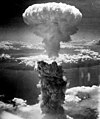The Nuclear Technology Portal
Introduction

- Nuclear technology is technology that involves the nuclear reactions of atomic nuclei. Among the notable nuclear technologies are nuclear reactors, nuclear medicine and nuclear weapons. It is also used, among other things, in smoke detectors and gun sights. (Full article...)
- Nuclear power is the use of nuclear reactions to produce electricity. Nuclear power can be obtained from nuclear fission, nuclear decay and nuclear fusion reactions. Presently, the vast majority of electricity from nuclear power is produced by nuclear fission of uranium and plutonium in nuclear power plants. Nuclear decay processes are used in niche applications such as radioisotope thermoelectric generators in some space probes such as Voyager 2. Energy production from controlled fusion power can potentially eliminate some resource restriction facing fission power, but it is not expected to be commercially available in the near future. (Full article...)
- A nuclear weapon is an explosive device that derives its destructive force from nuclear reactions, either fission (fission bomb) or a combination of fission and fusion reactions (thermonuclear bomb), producing a nuclear explosion. Both bomb types release large quantities of energy from relatively small amounts of matter. (Full article...)
General images -
Selected article -
The British government initially negotiated with the Carter administration for the purchase of the Trident I C-4 missile. In 1981, the Reagan administration announced its decision to upgrade its Trident to the new Trident II D-5 missile. This necessitated another round of negotiations and concessions. The UK Trident programme was announced in July 1980 and patrols began in December 1994. Trident replaced the submarine-based Polaris system, in operation from 1968 until 1996. Trident is the only nuclear weapon system operated by the UK since the decommissioning of tactical WE.177 free-fall bombs in 1998.
NATO's military posture was relaxed after the collapse of the Soviet Union in 1991. Trident warheads have never been aimed at specific targets on an operational patrol, but await co-ordinates that can be programmed into their computers and fired with several days' notice. Although Trident was designed as a strategic deterrent, the end of the Cold War led the British government to conclude that a sub-strategic—but not tactical—role was required.
A programme for the replacement of the Vanguard class is under way. On 18 July 2016, the House of Commons voted by a large majority to proceed with building a fleet of Dreadnought-class submarines, to be operational by 2028, with the current fleet completely phased out by 2032. (Full article...)
Selected picture -
Did you know?
- ... that T. K. Jones thought that a nuclear war was survivable if "there are enough shovels to go around"?
- ... that Project Ketch proposed the detonation of a 24-kiloton nuclear device in Pennsylvania to create a natural-gas storage reservoir?
- ... that after journalist Adele Ferguson's criticism of the U.S. Navy's sex discrimination attracted nationwide attention, she was offered a personal tour of a nuclear submarine?
- ... that before becoming a successful children's author, Myron Levoy was an engineer doing research on nuclear-powered spaceships for a mission to Mars?
- ... that the Russian and Belarussian military exercise Zapad 2009 involved nuclear-capable ballistic missiles?
- ... that in 1958 the Scyla theta pinch device was the first to demonstrate controlled nuclear fusion in the laboratory?
Related WikiProjects
Things you can do
| Parts of this portal (those related to section) need to be updated. Please help update this portal to reflect recent events or newly available information. Relevant discussion may be found on the talk page. (September 2021) |
Selected biography -
Born in New York City, Oppenheimer obtained a degree in chemistry from Harvard University in 1925 and a doctorate in physics from the University of Göttingen in Germany in 1927, studying under Max Born. After research at other institutions, he joined the physics faculty at the University of California, Berkeley, where he was made a full professor in 1936. Oppenheimer made significant contributions to physics in the fields of quantum mechanics and nuclear physics, including the Born–Oppenheimer approximation for molecular wave functions; work on the theory of positrons, quantum electrodynamics, and quantum field theory; and the Oppenheimer–Phillips process in nuclear fusion. With his students, he also made major contributions to astrophysics, including the theory of cosmic ray showers, and the theory of neutron stars and black holes. (Full article...)
Nuclear technology news
- 11 October 2024 – 2024 Nobel Peace Prize
- This year's Nobel Peace Prize is awarded to Japanese atomic bomb survivors group Nihon Hidankyo for "its efforts to achieve a world free of nuclear weapons and for demonstrating through witness testimony that nuclear weapons must never be used again". (The Washington Post) (Nobel Prize)
- 27 September 2024 – Russian invasion of Ukraine
- Nuclear risk during the Russian invasion of Ukraine, Belarusian involvement in the Russian invasion of Ukraine
- Belarusian President Alexander Lukashenko warns that Belarus will use Russian nuclear weapons if the country is attacked by NATO. (Anadolu Agency)
- 26 September 2024 –
- A United States defence official claims that a Chinese nuclear attack submarine, the first of the new Zhou-class, likely sank during construction earlier this year. (ABC News)
Related portals
Related topics
Subcategories
Associated Wikimedia
The following Wikimedia Foundation sister projects provide more on this subject:
-
Commons
Free media repository -
Wikibooks
Free textbooks and manuals -
Wikidata
Free knowledge base -
Wikinews
Free-content news -
Wikiquote
Collection of quotations -
Wikisource
Free-content library -
Wikiversity
Free learning tools -
Wiktionary
Dictionary and thesaurus






































































































